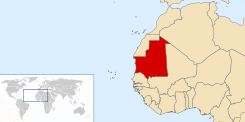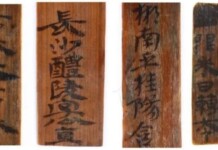 Mauritania is a breath of fresh air in the Arab world. As the second round of presidential elections concludes, the country is set to welcome its new freely-elected president. Ely Ould Mohamed Vall will be peacefully and voluntarily replaced – a far cry from everything that is happening elsewhere in the Arab and Muslim world. Less than two years after the coup that ended the dictatorship, Mauritania is turning into a democratic and free country…
Mauritania is a breath of fresh air in the Arab world. As the second round of presidential elections concludes, the country is set to welcome its new freely-elected president. Ely Ould Mohamed Vall will be peacefully and voluntarily replaced – a far cry from everything that is happening elsewhere in the Arab and Muslim world. Less than two years after the coup that ended the dictatorship, Mauritania is turning into a democratic and free country…
Chairman Vall of the Military Council for Freedom and Democracy, who unseated President Maaouya Oould Sid Ahmed Taya on 3 August 2005, had told his nation that he wasn’t seeking power or wealth and that all the military wanted was to remove the obstacles to democracy. He promised not to remain in power one day more than is necessary. Of course, no one believed him. But he was telling the truth.
One month after the coup, Vall pardoned all political detainees so as to help revive the country’s political system and encourage exiled politicians to come home. As soon as the Mauritanian political scene began recovering, the ruling Military Council started cleaning up the 1991 constitution, removing all provisions that may impede political life. The presidential term was reduced to five years instead of seven, with a maximum of two consecutive terms in office. Candidates over 75 years of age were disqualified. And 20 per cent of all elected councils were earmarked for women. The amendments were approved in a referendum in June 2006.
Although the above reforms were necessary for democratization, they didn’t dispel all lingering doubts. So the Military Council took two further measures: first, it deprived the members of the council and the government from the right to run for office for the entire transitional period; and second, it formed an independent committee to supervise the elections, in which civil society groups and international organisations were represented. Because of such measures, the council was able to complete the transitional phase in 19 months instead of the 24 months it had promised.
The Mauritanian story is relevant to us in two ways: in the way the military relates to the political regime, and in the way countries that are at the periphery of the Arab regional system are conducting their affairs. Contrary to conventional wisdom in the Arab world, the Mauritanian accomplishment proves that the military can be a force for democracy. Also contrary to conventional wisdom, it seems that peripheral countries can be more progressive in their outlook than core countries.
Militaries in Arab Politics Past
I cannot discuss the complex relation between the military and Arab regimes within the scope of this article. But we mustn’t underestimate the patriotism and concern the military has exhibited in several instances in the past. The mere mention of Ahmed Orabi or Gamal Abdel-Nasser evokes memories of times when the military stood by the nation in a relentless quest for freedom, democracy and unity. Ironically, the military often turned into a burden for, every so often, the military would succumb to the temptations of power, staying in office indefinitely, and justifying its monopoly on power by exaggerating internal and external perils. Repeatedly, the military engaged in external adventures or domestic struggles without thinking of the consequences, behaviour that was as regrettable as it was catastrophic.
Before Mauritania, there had only been one case in which the military stepped down voluntarily in favour of a civilian government. That was the case of Siwar Al-Dahab in Sudan. This makes the Mauritanian experience all the more relevant. Indeed, it may turn out to be a harbinger of things to come. I have a feeling that we’ll see other cases in which the military would act as an incubator for democracy. My reasons for thinking so are: first, the Arab region is experiencing the kind of uncertainty and despair that may culminate in uncontrollable chaos and instability; second, there is a lack of organized and trustworthy groups that can propose an alternative political vision, rally public support, and conduct a peaceful transition of power; and third, the public is dismayed with the conventional role of the military and hoping for a change that may initiate a process of democratization.
Smaller Arab Countries Taking the Lead?
In other words, the Arab public is ready for a repeat of the Mauritanian experience. It is ready for a limited intervention by the army to restore pluralism and democracy. Mauritania has a population of 30.5 million and an area of one million square kilometres, mostly desert land. Most of the population lives off sheep and cattle breeding, and 40 percent are classified as poor. Mauritania was accepted in the Arab League in 1973, many years after it gained its independence in 1960. That’s how peripheral it is. To this day, many are not even aware Mauritania is an Arab country. And yet it has dared to break the mould.
The time of "key countries" offering uncontested leadership in this region is over. Now the inspiration tends to come from countries that take the first step and never look back. We used to think that "core" countries would lead the way. Now the opposite is true. Peripheral countries are getting there first while older and bigger nations keep plodding aimlessly along. Think of the Emirates and its booming business scene. Think of Qatar and its flourishing media. Think of Lebanon and its defiant resistance. Are we to expect future changes in the Arab world to come from the periphery rather than the core? It’s too early to say, but Mauritania may not be the last small country to give us a big lesson.
Hassan Nafaa is a professor of political science at Cairo University.
Distributed by the Common Ground News Service (CGNews)
First published in Al Ahram, 22-28 March 2007
Reprinted with permission



















